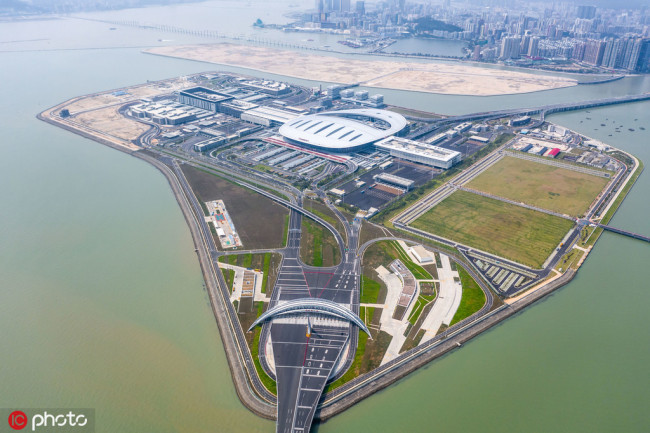An international forum for major global bay areas Friday launched a new cooperation platform to exchange resources and development ideas.

An aerial view of the world's longest cross-sea bridge, the Hong Kong-Zhuhai-Macao Bridge, in Zhuhai city, south China's Guangdong province, 19 March 2019. (Photo: IC)
The Global Bay Areas Cooperation Council (GBACC) will serve as a bridge to assemble resources of the world's top bay areas, create a resilient and globally-interconnected economic system and help the bay areas address global challenges by complementing with each other and securing coordinated development.
The Global Bay Areas Cooperation and Development Forum (GBAF), organized by People's Daily Online West USA, brought together prominent leaders, entrepreneurs and scholars from academic institutions, think tanks and major metropolitan and bay areas worldwide.
Under the theme "Connection, Cooperation, Development," the forum was dedicated to exchanges and cooperation between China's recently established Guangdong-Hong Kong-Macao Greater Bay Area and bay areas in other countries, namely the San Francisco Bay Area, New York Bay Area and Tokyo Bay Area.
China's Consul General in San Francisco Wang Donghua said the bay areas possess unique economic models, and development in these areas depends on globalization and a high level of openness.
The world's major bay areas have all benefited from economic globalization and policies advocating freedom, openness and inclusiveness, Wang said.
China's decision to build the Guangdong-Hong Kong-Macao Greater Bay Area allows it to remain open to the outside world and embrace globalization, Wang said.
He pointed out that the Chinese Greater Bay Area, which boasts convenient transportation, abundant human talent and the support of a huge domestic market of a 1.4 billion population, will offer new and more opportunities for other countries and regions.
He said the forum is of special significance as it provides a platform for various parties to share their experiences and expertise and to explore solutions to problems facing bay areas at a time when there is growing outcry against globalization.
Steven Rockefeller, Jr., chairman of PFC & SRJ Culture LLC., cautioned that anti-globalization has become a new trend worldwide and many countries are abusing protectionism, which further dampens global economic development.
Amid the wave of globalization that meets emerging trends in regional development, global bay areas are now facing a new historical era of development, he said.
It's a pressing issue for the bay areas to collaborate by utilizing innovation, dialogue, and cooperative development to advance to the next economic level, Rockefeller said.
He held high expectation for China's first bay area -- the Guangdong-Hong Kong-Macao Greater Bay Area.
The Chinese Greater Bay Area is "a region with the largest economic aggregate in China and is in the vanguard of China's bay area economy," he said.
The bay area consists of the Hong Kong Special Administrative Region, the Macao Special Administrative Region and nine cities in Guangdong Province, with a combined population of about 70 million and a gross domestic product of about 10 trillion yuan ($1.48 trillion) at the end of 2017.
Jim Wunderman, president and CEO of the Bay Area Council in San Francisco, said the Chinese Greater Bay Area program has brought San Francisco and China closer together.
"We see China as a major strategy for our region as well as regions of the world to see how we can connect better, how we can offer more, and how we can expect more from our partners around the world," he said.
In their several panels, the attendees of the one-day event discussed government policy, smart cities, urban development, climate change, technology innovation and investment, as well as sustainable development.
Cover image: People's Daily online


